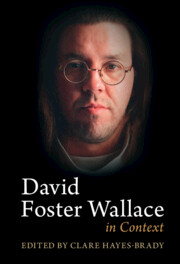Book contents
- David Foster Wallace in Context
- David Foster Wallace in Context
- Copyright page
- Contents
- Figures
- Contributors
- Acknowledgments
- Abbreviations
- Introduction
- Part I Contexts
- Chapter 1 David Foster Wallace and Narratology
- Chapter 2 A Meeting of Minds
- Chapter 3 Writing in a Material World
- Chapter 4 Confidence Man
- Chapter 5 David Foster Wallace and European Literature
- Chapter 6 David Foster Wallace and Poetry
- Chapter 7 David Foster Wallace’s “Non”-Fiction
- Chapter 8 “Thanks Everybody and I Hope You Like It”
- Chapter 9 David Foster Wallace and Visual Culture
- Part II Ideas
- Part III Bodies
- Part IV Systems
- Works by David Foster Wallace
- Bibliography of Secondary Sources
- Index
Chapter 8 - “Thanks Everybody and I Hope You Like It”
David Foster Wallace and Entertainment
from Part I - Contexts
Published online by Cambridge University Press: 18 November 2022
- David Foster Wallace in Context
- David Foster Wallace in Context
- Copyright page
- Contents
- Figures
- Contributors
- Acknowledgments
- Abbreviations
- Introduction
- Part I Contexts
- Chapter 1 David Foster Wallace and Narratology
- Chapter 2 A Meeting of Minds
- Chapter 3 Writing in a Material World
- Chapter 4 Confidence Man
- Chapter 5 David Foster Wallace and European Literature
- Chapter 6 David Foster Wallace and Poetry
- Chapter 7 David Foster Wallace’s “Non”-Fiction
- Chapter 8 “Thanks Everybody and I Hope You Like It”
- Chapter 9 David Foster Wallace and Visual Culture
- Part II Ideas
- Part III Bodies
- Part IV Systems
- Works by David Foster Wallace
- Bibliography of Secondary Sources
- Index
Summary
As the central villain of Infinite Jest, entertainment is a persistent preoccupation in Wallace’s writing. He presents it as a locus of neoliberal power in ways that anticipated the development of tailored entertainment services well ahead of time. This chapter examines Wallace’s representation of entertainment, couching it particularly in its antagonistic relationship with attention and engagement, which his work elevated as cardinal virtues. This chapter situates Wallace’s vision of entertainment in a critical paradigm of entertainment as a form of individual and social control, and as the ultimate Jamesonian manifestation of late capitalist flattening, arguing that the anhedonia of Wallace’s characters is a direct result of the dominant forms and agendas of entertainment on display in his writing. The chapter also argues that the forms of entertainment in Wallace’s work invite and reflect the idea of absorption, which is characterized positively and negatively depending on its genesis. That is to say, the absorption of entertainment is contrasted with the absorption of boredom, and again with the absorption of attention, with widely diverse effects on the postmodern subject. Entertainment constitutes a seductive and deadening force that both unites and isolates the subjects of Wallace’s writing, the great threat to the contemporary self.
Keywords
- Type
- Chapter
- Information
- David Foster Wallace in Context , pp. 86 - 95Publisher: Cambridge University PressPrint publication year: 2022

